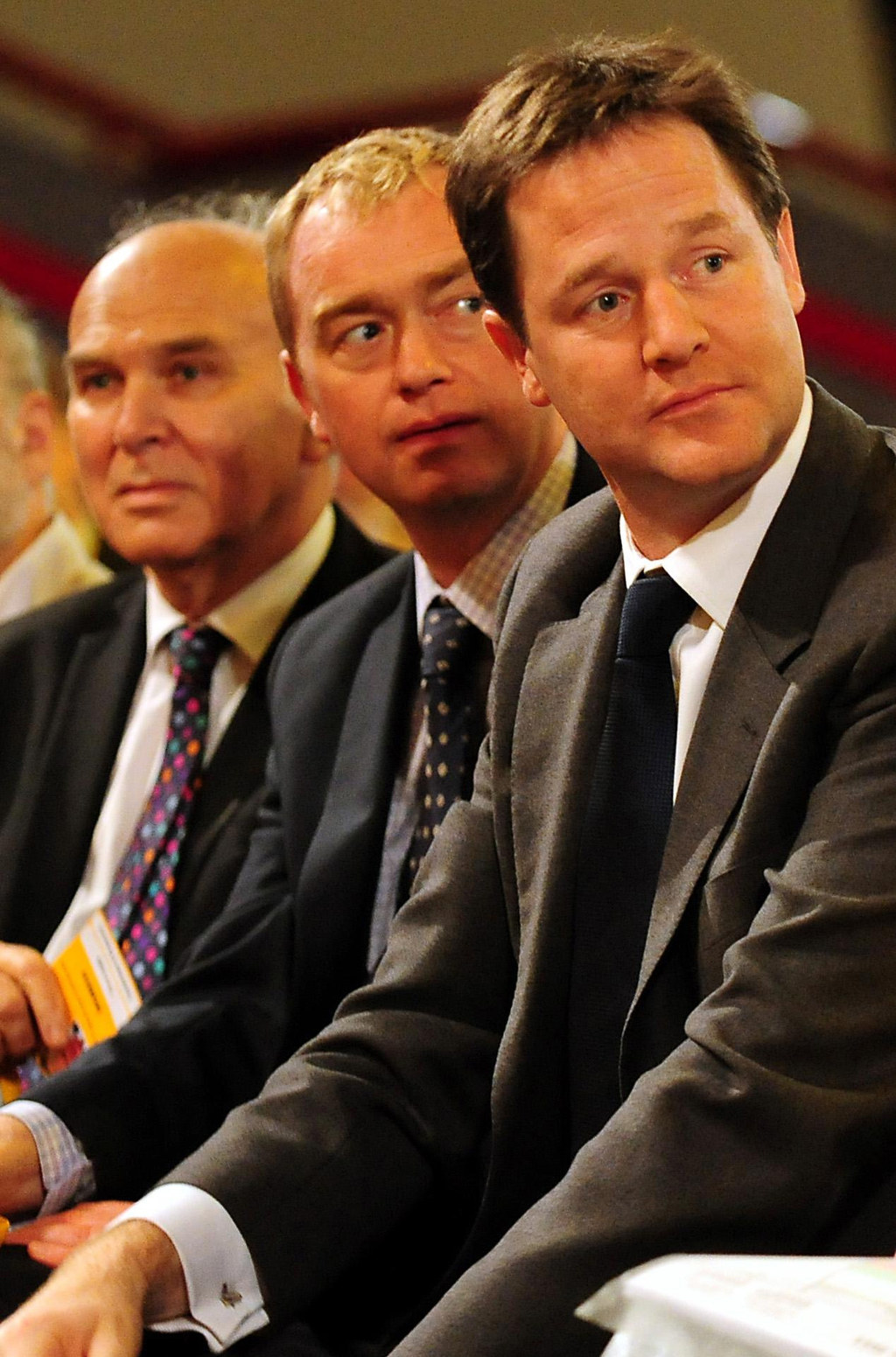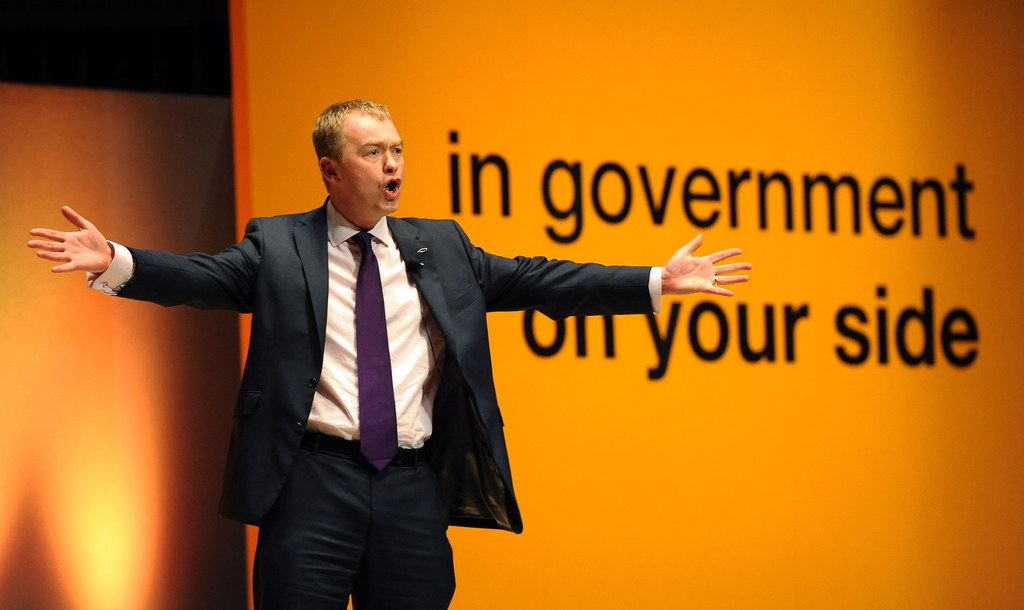
Tim Farron was knocking on doors on a council estate until 9:55pm on polling day before finally taking a rest. There was nothing more he could do in his Lake District constituency but wait for the results to roll in.
So he went back home to his wife, Rosie, and their four kids, and watched a bit of TV until it was time to head to the count in Kendal. At that stage – around 1am – Farron remained hopeful that the exit poll predicting the loss of all but 10 Liberal Democrat MPs was badly wrong.
In fact, the final result was even worse. He was returned as one of just eight across the country, down from 57 in 2010. And now it may well fall to him, as the favourite for the party leadership, to rebuild the Lib Dems.

In the weeks leading up to the election, senior Lib Dem figures had insisted – and appeared to genuinely believe – that the party would surprise pollsters.
"We knew on the day, I think, that our top likely figure was coming down," Farron tells BuzzFeed News, in an interview in his Westminster office. "But I don't think I thought it would be anything like that figure the exit poll said. I think I probably thought the worst we would end up with was mid-teens, something like that."
The impact on the party was brutal and immediate. Heavy-hitters Vince Cable, Ed Davey, Jo Swinson, Simon Hughes, Lynne Featherstone, and Charles Kennedy were all swept away in what Farron describes as a "tsunami of negativity".
He doesn't hesitate when asked whose demise was the biggest shock of the night. "The one I've literally shed tears over is Simon Hughes," he says. "It just hit me on the Saturday because I've knocked on doors for Simon – I've spent most Tuesday nights there since Christmas and I've known Simon since I was 19.
"But it's not so much that, it's the sense that defeat costs you the ability to help people."
Hughes' successor in Bermondsey and Old Southwark, Labour MP Neil Coyle, will "not be worth a 20th of what Simon is worth" to his constituents, Farron says bitterly. "This was a man [Hughes] who did unalloyed good. And he was swept out. And it makes you a little bit angry."

Farron, 44, is still yet to officially announce he is standing for the leadership of the party. Yet he has long been the bookies' favourite to take over from Nick Clegg, who stepped down last Friday.
Sitting on his window bench in the sun, Farron praises Clegg for "playing a blinder during the election campaign".
"We went into coalition with our eyes open," he says, "and while I may disagree with one or two things we did, nevertheless I think we did the right thing going into government. I'm very proud of him. He went in doing the right thing by the country knowing it was going to damage him personally."
The former party president appears affable and relaxed – until he talks about the fate of his colleagues, when he leans forward into the room to press his point, visibly pulsing with emotion.
"There's a sense of horror and outrage," he says, "that the party that's done so much good over five years was, by an incredibly well-funded tsunami of negativity – directed not at us but at either the English nationalists or the Scottish nationalists – swept away in the middle."
He insists he has no regrets about going into coalition. "History will be very, very kind to Nick Clegg, kind to the Liberal Democrats these last five years," he says. "Which makes me a bit angry – why didn't you give us our due when we needed it?"
However, he does promise that the Tories – whose route to power lay through the near-obliteration of their coalition partners – will pay the price.
"I do feel angry," he admits. "I mean, the sense is they will get their comeuppance. I'm certain of it, because the last thing David Cameron needed was to have a small Tory majority and a European referendum. It's quite possibly the end of the Tory party. This is either 1992 or 1974 and either way it's bad for the party in power."
As for Labour, he professes to have very little time for them either. "You've got a Labour party that doesn't have any narrative whatsoever," he says. He adds that they "cannot cope with an admission of some level of guilt in terms of getting the country in the mess it was in. [They're] an illiberal party, a party that tends to use UKIP-ish language on immigration.
"But I think in one sense – when you've got eight MPs, it's hard to argue this – but the Labour party are bit players in all this. They're not engaging in the main debate, I'd say we are."
He gains comfort from how former leader Paddy Ashdown turned around the party's fortunes after the "debacle" of the 1988 merger between the Liberal party and the Social Democratic party.
"I saw how Paddy Ashdown got the party by the scruff of the neck, gave it vision, gave it belief, set up an infrastructure, and just had an infectious bloody-minded collective determination that we were not going to die and we were going to do quite the opposite," he says.
"Within less than a decade of him taking over we got the best number of seats we'd had since Lloyd George's day."

So will he too grab the party by the "scruff of the neck"? He insists he hasn't yet decided.
"I am sifting through, listening to, responding to countless, hundreds and hundreds of letters, emails, Facebook [messages], tweets," he says. "The party was built from its post-war nadir from the grassroots and it will be rebuilt from the grassroots.
"It's not a case of someone sitting in Westminster telling the party what they're going to do. So it's right I give some time before making a decision as to what role I would play and to listen to those people."
Farron may be the obvious favourite, but it's fair to say that he won't have the support of all his former colleagues. In March, Cable told BuzzFeed News bluntly that Farron was not a "credible leader".
"He sent me a text less than 24 hours later to apologise profusely," Farron insists. "And even if he hadn't, I still hold him in massively high regard, and we owe him a lot."
So far the only person to thrown their hat into the ring for the Lib Dem leadership is former health minister Norman Lamb, who Farron praises as "a friend, somebody who has operated in parliament in a way that I sought to emulate." Greg Mulholland, whose parliamentary office is right next door to Farron's, is also tipped to stand. All Lib Dem members can vote in the ballot, and the winner will be announced in mid-July.
So far, the only thing people know about Farron's leadership plans – beyond the fact that he is much more in the party's left-wing tradition than the more centrist Clegg – is that he has proposed changing the Liberal Democrats' name to "the Liberals". But this, he tells BuzzFeed News, is categorically not true.
"I use the word 'liberal' as shorthand," he says. "I am a liberal – that is my ideology." But he dismisses formally changing the name as "stupid navel-gazing".
"Going through the constitution and changing the name, having a two-thirds majority and people thinking we're repudiating the SDP?" he says. "Don't be silly, that's not going to happen."

Farron says he is "enormously encouraged by the gobsmacking rise in party membership" since the election. As of Tuesday, the party has seen an extra 10,000 people join up – "double the amount we increased it by during Cleggmania".
He believes this is because "an awful lot of people think there's never been more need for a liberal party". He adds: "The first thing the Tories do is threaten to repeal the Human Rights Act, to introduce a snoopers' charter, to bring in £12 billion of welfare cuts – absolute tangible proof of why we were so important in government.
"I think there's a great sense now that while our parliamentary voice is obviously really diminished now, our ability to have a voice in the country might actually be massively amplified."
And he's already looking ahead to the Welsh Assembly and Scottish parliament elections next May as a chance for the Lib Dems to prove they are not a spent force. "They are crucial and we have to make sure we go out and get very good results there," he says. "They're in one sense the first fruits of the fightback."
So how long will it take for the party to rebuild itself? "I don't know, I'll tell you when we've done it. But we are going to do it."
